6th November 2023
Listen
Listen
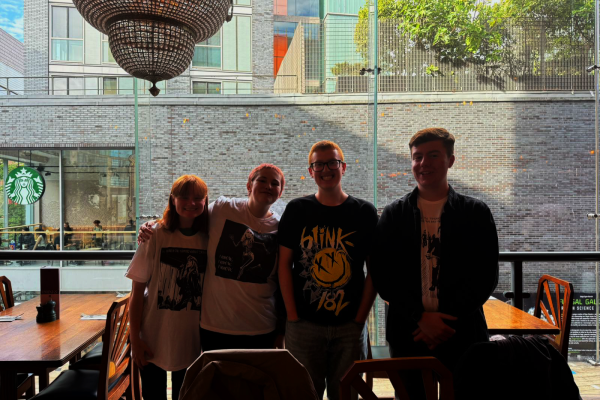
So, this article is a little different to my typical critical review. Rather than inform you of something external to my personal experiences, I would prefer to give you some insight into me as an individual. Regardless, that does mean you CAN expect me to ramble on for a little in this.
Specifically, a little snippet into the 2025 Summer I shared with my friends. In particular, I loved getting the chance to spend time with 3 of the closest people in my life.
To truly explore how my summer went, we first have to go back to Wednesday 8th June.
My final A-Level exam.
What had been a long and gruelling 2 weeks revising Computer Science after finishing my English and Media exams between the 4th and 5th of June – truly a nightmare for someone who always preferred the ‘mickey mouse’ subjects over STEM – was the Paper 2 Theory exam. My Johnnywonny followers at the time will remember my Instagram story rants, with me meme-ing the hell out of Alan Turing in Paper 1; I gave Paper 1 a 5/10, recognising my ability to quickly comprehend and answer the questions but completely thrown off by Paper 2 content within Paper 1, where AQA used encryption as an unseen programming task.
They were also really sneaky and didn’t include any Object-Oriented Programming this year, with my teachers convinced they would get it in there somehow. I was at least proud of my Big O Notation revision, rinsing the hell out of active recall between the days of my Paper 2 Media exam and first Computer Science exam. If words such as Big O Notation, encryption and Object-Oriented Programming sound like complete and utter waffle to you, I am sorry.
For Paper 2, I was both nervous and excited: scared about how I may perform due to my struggles on Paper 1’s Programming paper but also ready to conclude exam season on a relatively high note (I was praying for a moral/legal/cultural issues of computing question I could waffle on). Theory was always my strongest side of Computer Science (although this didn’t mean I was an expert), grasping the concepts a lot better than the embedded mathematical principles in computation (I still remember the day I was advised not to choose Computer Science after getting a Grade 5 in GCSE Maths but oh well, I look back on the decision more fondly rather than at the time).
There were moments, fleeting but at the same time constant, where I was desperate to get out of doing the subject entirely, genuinely questioning if I was even academically competent. I’ve always been a strong believer that the work you put in is what you can expect; despite me achieving a Grade 7 in GCSE and being someone who is able to knuckle down and get the work done, A-Level Computer Science just seemed to be a different beast entirely.
This difference in academic structure and approach to content seems to be a regularity within A-Level subjects, such as History, Business and Biology. For me, I saw this jump within English and Computer Science like it was night and day: new rules, same old anxieties cropping up. Anyways, in summary, I wasn’t sure where I stood with Computer Science, aspiring for a B or A but more than content with a Grade C.
The turnout was so good that I was even actively scouring through TikTok for other people’s responses to the exams and capped off the Instagram A-Level exam discussion with an ‘absolute cinema’ meme of Dexter Morgan. Also, I couldn’t have been the only person who was trying to stay updated on how both mine and other subject exams were turning out, right? I loved getting to see how English Lit and English Language students were faring against the paper’s questions. How all of us Media students were confused why Eduqas trimmed out the final scenes of HAIM’s Now I’m In It for the unseen 15-marker question on media language. Oh, and why AQA ever thought that robots question in Paper 2 was a good idea.
And it wasn’t just how I interacted with social media; it was how I performed in the exams. I mean, it’s not every day you manage to reference Gregory House in a comparative analysis essay. Or how Edexcel gave us the most out of pocket question in perhaps their entire syllabus’ history. Seriously, out of all the years and with no inclination, why did they decide that the apartment for A Streetcar Named Desire was the best decision for us 2025 students? Me, my friends and my English teacher were ALL convinced that it was either going to be a character or a theme. It wasn’t. There was also me accidentally condoning incest by misinterpreting HAIM’s band as not being sisters. To be fair, if you watch the video, you may understand why I (as someone who doesn’t know very much about them) and other people thought this.
What else? Oh YEAH. I was convinced that the unseen text in English Paper 2 about Margo Price giving up alcohol was my best essay ever – only because of 1 point where I discussed how the sentence clause being enclosed paralleled how she internalised her addiction. Sounds deep and nuanced, right? Was my weakest essay out of both papers. Woops. I also had completely forgot in Media Paper 2 to do the other side of an argument in the last question. This was about semiotic theory for Zoella vs Attitude, telling the examiner, and I quote, “ran out of time :)”.
In retrospect, these experiences sound ridiculous. But they happened. Anyway, let’s get onto the actual ‘summer’ part of the article.
So, summer finally arrived. The second I got home from college, I immediately put my feet up and watched Babylon (which was an incredible meta commentary on the craft of filmmaking and why we as audiences engage with the medium itself). Then, as part of my tradition with English and Media post-exam, I located my Computer Science workbooks and binned them. There is no truer satisfaction than knowing you will never have to deal with Boolean algebra, floating point binary and Skeleton Code ever again. 374 pages, all gone in an instant. It is still hard to believe that was 2 years of mostly stress and burnout, so bad that I actually cried the day after my exam, something which was unexpected but was probably a long time coming.
The summer mostly went like this for me: sleep in for longer, doom scroll like there was no tomorrow and go out as much as possible. Rinse and repeat. For me, this felt like my redemption arc after choosing to lock in FAR too much during lockdown. A notable moment which I had planned with my friends Brooke and Alex prior to A-Levels was binge watching all of the Star Wars films, with us actually committing to this task and consuming all the way from Episode 1 to Episode 6.
We weren’t subjected to the new modern trilogy, probably due to their poor reception and arguable franchise disservice. This movie marathon was interspersed with K-Pop, Indycar and NASCAR, which I can’t really complain about. There was also a lot of people’s birthdays this summer, both friends and family. Nothing quite like alcohol and karaoke to really lift your spirits after 2 years of hard work.
I also went on my first night out ever? I discovered my love for Spoons and a cheeky Purple Rain pitcher (thank you Lucy for that). It was actually pretty fun – although I don’t think I am too keen on them as a concept, much preferring a house party. I would argue my clothes became more diverse (probably because I was working more and could afford to expand my wardrobe) than the normal roadman aesthetic.
Attempted to read more books (got through some of Chomsky’s work and was mad he wasn’t feeding my linguistic cravings, so I rage quit-). Continued pushing out muggies and additional wholesome content onto the Johnnywonny account, your standard stuff of course. OH! Binged a lot of shows and films this summer.
Managed to watch Dexter: Resurrection, as well as The Office US. I also dressed up as Jim Halpert, which was pretty great. Got to go Oulton Park again, this time for the US Autoshow (saw my childhood heroes of Optimus Prime and Bumblebee) and got sunburnt even though I put sun cream on. Was slandered at a 2000s party for apparently NOT dressing 2000s enough (what do you mean a retro grey Nike jumper and white Reeboks aren’t enough for you people-).
Went to get my A-Level results and was spreading propaganda in fresher group chats. I also got rid of my phone case for a new blue one (it was originally an old granddad purse, which was very practical but not very nonchalant). Got into musicals again via Moulin Rouge. We also gave my friend Harrison a proper send-off for him leaving to the Navy.
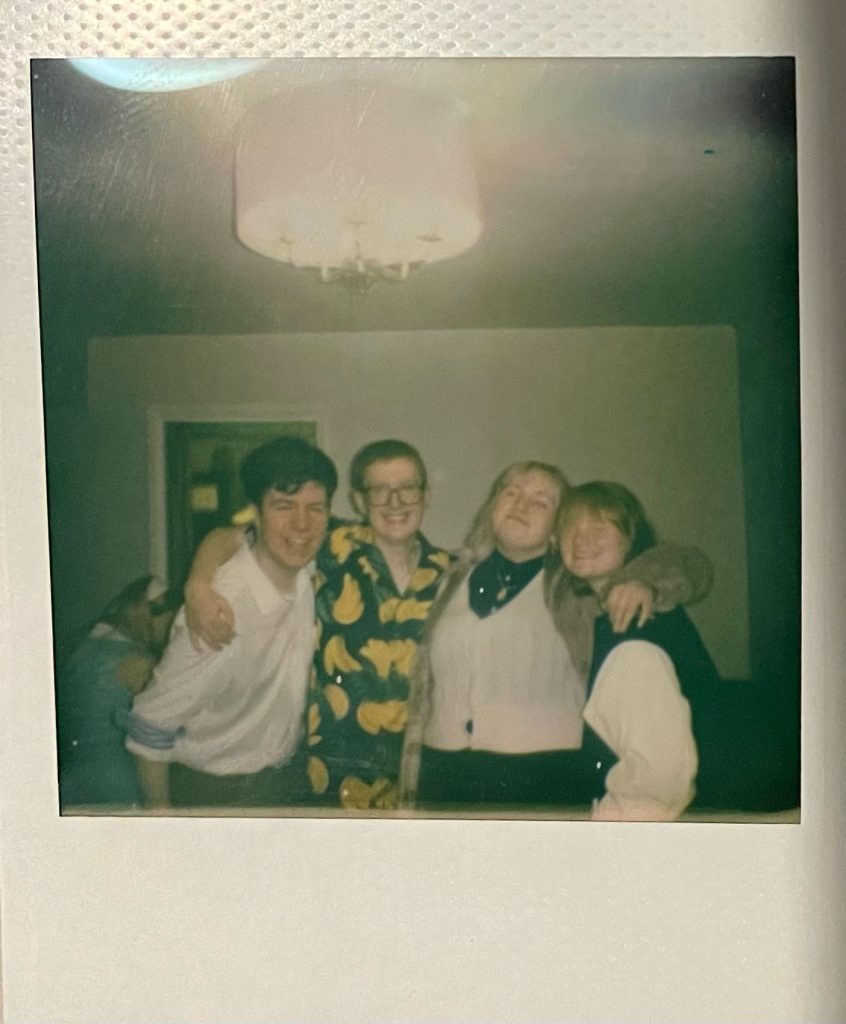
The most important thing that happened this summer? I reunited with my best friends Fifi, Sophie and Liam. Even though we had maintained contact throughout the 2 years, A-Levels often disrupted our plans. Regardless, this summer was all about reconnecting and spending time doing whatever we wanted, free from academic restraints. The last time we were together, we had an incredible night out. Even now, we still maintain this connectivity and so I thought it was important to see what Fifi and Sophie were up to (didn’t need to ask Liam, as he attends LJMU and I see him a lot of the time), since Fifi had moved to Glasgow and Sophie to Durham. To do so, I conducted an informal interview for each of them.
DISCLAIMER: These interviews were taken on Thursday 6th November, so some information may not be accurate when this article is published.
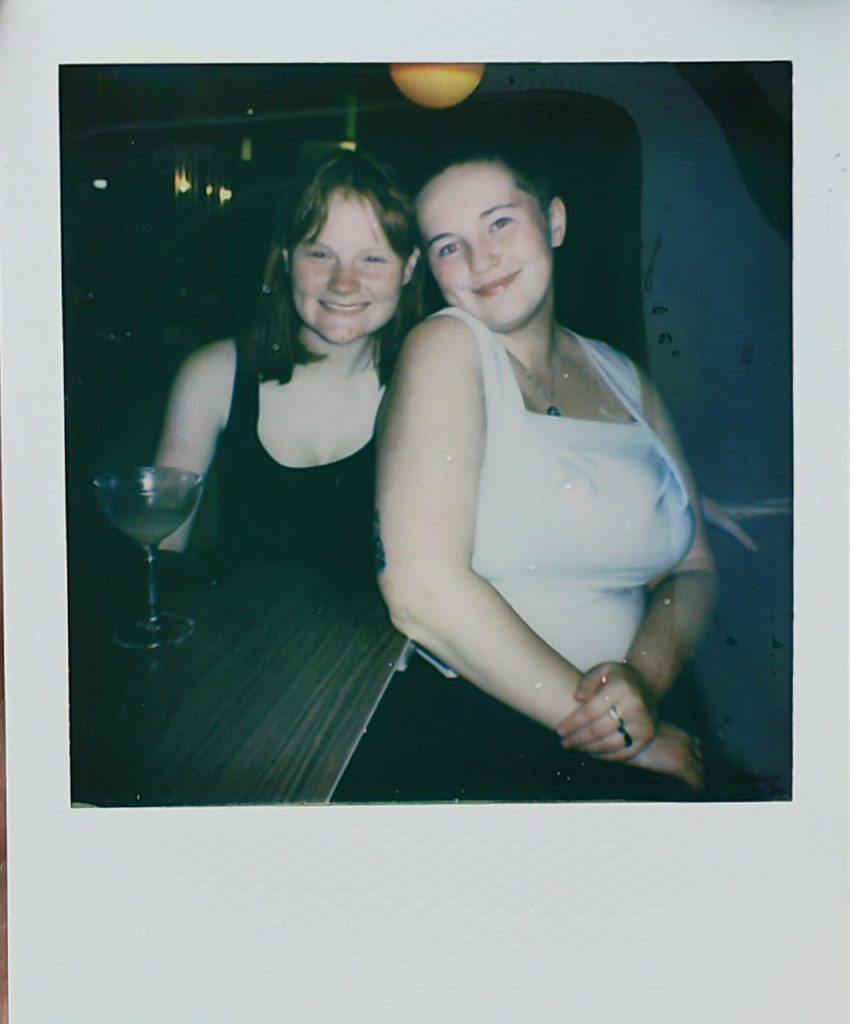
Subjects: English Literature, Philosophy and Portuguese (swapping this for Comparative Literature)
University has been really good for me so far. I think moving to a new city kinda gave me a different university experience that I kind of really needed, and I think it pushed me towards that independent lifestyle that university leans towards.
The main difference [between A-Level and university] is that you HAVE to do what you want to do. Like, nobody checks if you don’t go to lectures or if you do your exams or any extra reading really apart from seminars. But even then, you’re not really forced to do anything for them. The specifications are a lot quicker and you move a lot more through university.
So, for example, at the minute I have done 5 genres (sonnets, ballads, free-verse, blank-verse, romantic and epics) of poetry from when I started in September 20th to current day. It is really quick-paced, so it’s important to keep up with that. A-Level goes a lot slower, because I feel it is more focused towards exams. Whereas, university is split into termly exams, which I think is a lot better. At university, I’m doing something because I love it, with the teaching being something that I really like.
The difference is within the pace and how much you can do. A-Level is very specification-based, so you don’t really talk about much extra reading. And if you do, you’ve got to limit it to a specific question. But at university, it’s close readings of a poem. So, you use different analysis, opinions from other people. So it is a lot more [the sense of choice] where you can take your own direction with it really.
So, for example, I was taking Emily Dickinson’s ‘Split the lark’ blank-verse poem as a religious Protestant hymn. I used this as a way to kind of show the difference between deontological and empirical knowledge. We can’t always use this to find beauty in the soul, as trying to uncover something that’s not meant to be found can be quite corruptive. That’s just one example, but I think the main difference is the amount of extra reading you can do and the direction you can take your writing.
[note: I completely agree with Fifi. When I studied English Language and Literature at A-Level, the idea of extra reading and using articles from databases was a last minute addition and more of a ‘cherry on top’ approach, with more attention provided towards exam strategy]
As part of my degree, I do a joint honours with English Literature and Philosophy. Philosophy at the start of the degree at the minute has been very simplistic; it’s an introduction for beginners and people who’ve never done Philosophy. For me, it was a privilege to do it at A-Level. So, at the minute, it is very ‘how to identify arguments’, such as validity and soundness. And we’ve recently touched on morals, where we did Peter Singer and animals and child poverty and things like that.
And we are currently doing something called propositional logic, which is quite similar to Computer Science apparently, which I didn’t know. We do things like truth tables, translating sentences and tableaux (another form of truth table essentially). And that’s hidden from A-Level, because again the themes are extremely short. So, we spent about 6 months on moral philosophy back in A-Level, covering Kantian ethics, utilitarianism, Aristotle and meta-ethics. For morals in first semester Philosophy, we only did applied ethics to 3 themes: animal suffering, veganism and poverty.
So, again, it’s quite quick-paced and I think it’s more to do with an introduction into Philosophy at the minute to help you realise what you want to do. There’s a lot of options in Philosophy, it’s very big and I think they try to cover a basis in the first year to help you decide what you like. That’s what I think is really important, especially for Philosophy.
[note: Yeah, so when she explained to me what propositional logic was, I told her it reminded me a lot of when I learned Boolean Logic and Truth Tables at GCSE and A-Level Computer Science. It seems somehow my learning was less complicated, even though Boolean Algebra was one of the worst aspects of the subject]
So, because I am in a Scottish university, I take an elective subject, which I study for 3 years. I chose beginner’s Portuguese because I wanted to learn another language. However, when doing this, I realised that it was too much pressure for me and I should have stuck with something I was good at. I switched to Comparative Literature and Heroic Women.
I suppose to people in a similar position to me, I spoke to my advisor (everyone gets them in first year) but if you don’t have one, you can speak to your course administrator. See what other courses are available, see some general introductions to other courses and see which ones you like the most. So, I went to my advisor unannounced, informing them of my struggles with Portuguese and if I could swap it next semester. So, university is often credited for the year. So, next semester I had to take something – which was Comparative Literature – to get points. Hence, why I am still doing Portuguese this semester.
The main thing is to just speak to someone about it because the worst thing you can do is just let yourself suffer in silence, because again as I’ve said, [university] is very self-motivated. If you’re not going to put the work in, that will reflect on your grade.
So, a recently successful thing I became a part of was the ‘Thoughts: Philosophy Untangled’ podcast, which has been running now for about 20 years. How we typically plan this is we will have an idea and will email a researcher (a PhD professor) or just a general philosopher on a certain topic.
So, something that I’m doing at the minute is I’m talking about infallibilism and knowledge. I believe we can still have an infallibilist take on knowledge, despite Cartesian knowledge being so criticised, because there are ways to get around this in modern day. In terms of scheduling, we typically take a while to find a professor willing to do it and that can be quite a lot of work, to be honest.
I’m still finding a professor at the minute. We usually do a podcast episode on a weekly to 2 weeks basis. For me personally, this isn’t my first time being exposed to this. I’ve been on [the] BBC twice and ITV once. I have spoken about adolescence, feminism and typical politics within the UK and world. I feel like that’s really helped because it allows me to be good at explaining myself by having these public opinions and actually talking to other people.
I know that might sound kind of silly but when you’re actually sitting down with people and have an academic conversation, its important to keep it on a degree of understanding which everyone can contribute to rather than some complex discussion.
So, yeah. I published a poetry anthology called I AM back in 2023, which is where I got reached out to by Bookleaf Publishing and entered a poetry competition. This allowed me to get published; in retrospect, I would say my writing has improved a lot. At the minute, my main centre of writing is religious imagery, partially because I was meant to do an EPQ about the idea of cannibalism being a form of love.
I centralised particularly around Catholic religion and it was so interesting that I just found myself missing something I could have written. The past few poems I have written for a kind of new anthology I’ve been working on but I’m nowhere near yet to publish have been focused around different religions and this idea of consumption, beauty and fearing what we love.
I suppose I’m also drawn to new experiences, as well. I think for everyone attending university, the changes we have gone through. from Year 12 of not having much stress to Year 13’s chaos and to the summer before enrolment, have been quite scary. You know, the idea of leaving your friends and family behind. That was something I focused on quite a lot in my writing because it forced me to prepare for this long-distance relationship.
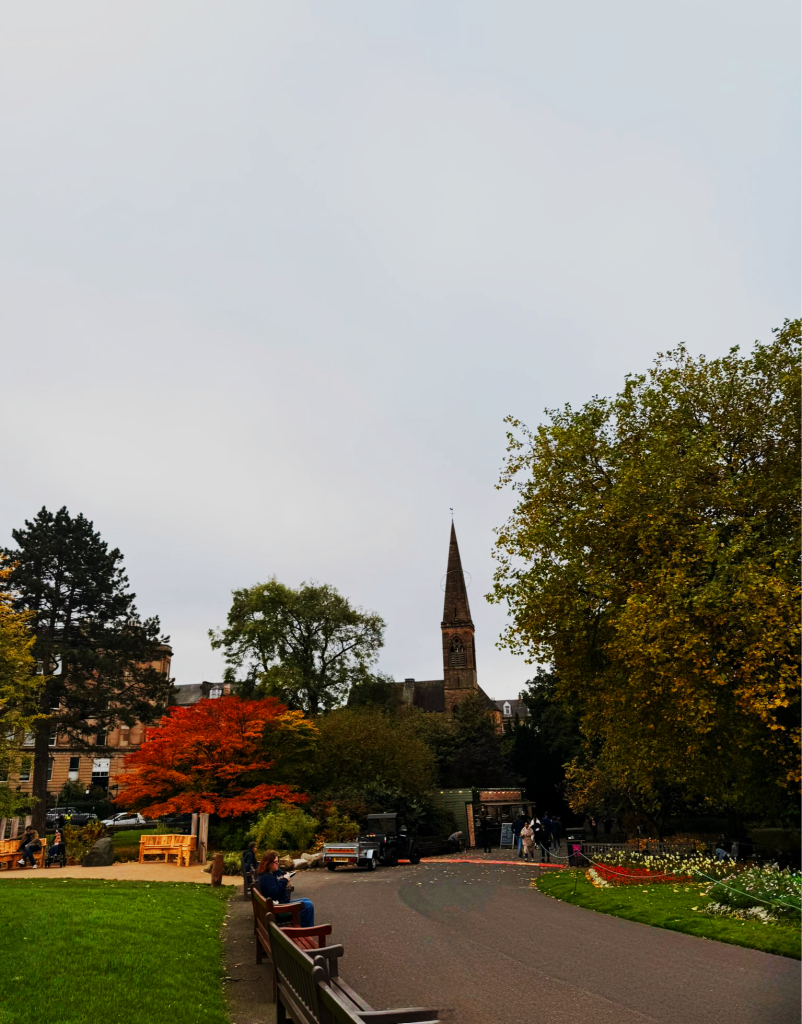
This is probably my favourite photo because that is when my best friend Sophie came down [from Durham] to come see me in Glasgow. Also, autumn is my favourite season as well and I like the orange tree. This was taken in the Botanic Gardens, which is quite a popular site. It is a beautiful little garden centre. I think it’s quite a homely and comforting photo and knowing my best friend was next to me brought comfort as well.
After we made that TikTok, I would say my routine has pretty much stayed the same. I try not to revise too much [in comparison to A-Level] because I don’t think I need to as much in where I am right now and for many universities, first years don’t count [towards your final grade]. I’m still getting used to this new place, meeting new people. Sometimes having a nice mix between revising and leisure is important. I go to all my lectures, I do like an hour or two of revision. I did a lot more in the past few weeks, because my midterms were due.
So, yeah, I’d say it’s pretty much stayed the same.
At the minute, that wouldn’t be possible for me to commence. However, I do think there is a market at the minute for this external, independent societies. I was in a bookstore the other day called Voltaire & Rosseau, which is like this beautiful place in Glasgow, where I spoke to the owner after buying a new book about Westernised philosophy. She was saying how they were going to start up some sort of Philosophy society, just like once every 2 weeks or month within the bookstore.
So, I think there is a want for these independent societies and I think it’s just nice to be able to talk about what you like without pressure. It’s like a fun little activity and if I was going to start up anything, I would stick to the World Schools Debate format. This is where you have 3 speakers (Speaker 1, Speaker 2 and Summary Speaker) and a basic Point Of Information (with 5 minute speeches and 3 minute conclusions).
This may come across as a cliché, but embrace the new start. Because it is scary, right? You leave all your friends, you’re packing up. I know I moved away quite far but even if you aren’t, the idea of watching your friends do so or having to commute to university can be quite daunting. You’ve gotta go in with an open mind because at the minute, I’ve really enjoyed it and didn’t think I would to be honest. I found myself looking forward to my lectures, I had a really good lesson on Keats’ romantic poetry yesterday [Wednesday 5th November] which was amazing. I came out of it and it felt so good to learn about something you genuinely enjoy.
So, I think you’ve gotta go in knowing that you chose to be here and that you want to do this. And some lessons can be like “ugh yeah oh god I wanna drop out” and it may seem hard at first because no-one is telling you to do anything. You know, you go in, you get this extra reading and no-one checks if you’ve done it. But it’s the idea that it’s a passion that you’ve enabled by going to university and I think you should embrace that.
I would also say to try and speak to as many people as you can who you think you’d wanna be friends with. Like, the best thing for me has been to just go out, be with somebody and just speak to them as it can be lonely. You know, you’ve already had this friend group and then you all split up because you don’t go the same universities, or your timetables are different. It feels like you’re quite alone. But the more people you speak to, be it accommodation, classes, the better you will feel about having friends or even acquaintances.
Subject: Psychology
I think overall university has been really good. At the start of the semester I was finding it quite difficult to acclimatise to university life but now that we’re a few weeks in I’m finding it so much easier to get on with my new daily life. I like the freedom I have in university: there’s a clear difference from being at home. It’s funny to be honest, like, I can just go to the kitchen and sit with a mug of wine at 3 o’clock in the morning and no one bats an eye. Lectures are interesting and the lecturers themselves are really nice. My only complaint is the fact my college is so far away from everything lmao.
I think the motivation to work has definitely significantly increased compared to A-level but I’d argue that I am still the same awkward little autistic introvert that I was back in college: I haven’t got any more social.
Psychology at university level is completely different to what we were doing at A-Level. For a start, the content is much more vast and we cover everything in such great detail compared to only touching on specific topics and then moving on – for example, at A-Level we would briefly mention how actions are caused by chemical changes in the brain whereas in university we go into depth about the action potential that occurs and how sodium and potassium ions move throughout the cells.
The topic content is a lot more interesting at university as well, because obviously I only do one subject it means that I have a lot more time to explore the fields that interest me the most and have tailored lectures to suit specific psychological branches. This makes the subject more enjoyable overall because even though I still have to participate in lectures that aren’t specific to what I am interested in having those “fun” lectures running alongside makes it overall more enjoyable.
My experiences with other universities is very minor so I’m not sure how I would really compare it. For me, I think that Durham is an incredible establishment. They offer such a high standard of teaching and the support systems they have are amazing. The college life and how much the university values community is admirable, especially since this is a system that works well. The colleges are so well connected within one another and it makes the environment feel incredibly safe.
Where Durham maybe doesn’t meet other universities is probably just the facilities around the university: everything feels so disconnected due to distance. My college (South College) isn’t really close to anything but other colleges – all of the bars are located in town so it’s a hassle getting to and from them on a night out (not that it’s really worth it anyway, the nightlife in Durham isn’t great to begin with) and shops are really far away.
Each college does have their own bar I suppose but these are usually dead unless there is a society organised event taking part in them. The distance realistically doesn’t take away from the status of the university but it is definitely something to consider about the university because part of the university experience surrounds the nightlife. The city itself is honestly one of the prettiest places I’ve ever been – you can see the castle and cathedral from almost everywhere in the city which makes the endless hike to Tesco worth it. Cobbled streets, great stone buildings, traditional churches everywhere you look – the whole place looks like something straight out of a novel. ‘University of the Year’ might be a stretch but it is definitely the place for me and I really enjoy going to Durham.
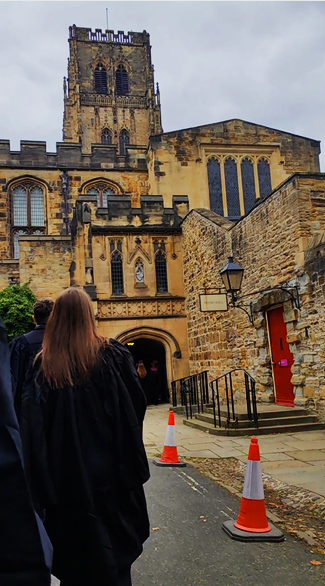
I can’t lie I haven’t taken many pictures while I’ve been at Durham because I hate taking pictures on my phone but this is definitely one of the best. The photo captures the moment we entered the cathedral to complete our matriculation ceremony. This day is a particular stand out memory for me because it is far from anything i have ever done before. Everyone was dressed in their formal clothes and gowns and we all had to complete a ceremony in which we signed our names and officially became members of South College and a wider Durham University. It was such a special day and the experience was so fun. The trip to Tesco afterwards was less fun and getting lost on the way to my flat was even worse xoxo.
Absolutely. When we made the TikTok, I was still in freshers week and was really finding it hard to actually fill my day with things to do. Since lectures have started my day has become a lot more structured and I spend a lot more of my time doing something productive (I still enjoy a cheeky post lecture nap though).
Take part in as much as you can at the start: societies, university organised events, flat nights out, literally anything. It’s pretty important to have connections in uni and I wish I would have taken part in more events before circles started closing off – I am pretty stuck at the minute.
So, that is how my summer went and what my best friends have been up to since. Obviously, it’s challenging when we can’t always be together in the same room but we make it work and embrace the time we get to spend with one another. Hopefully, this helps people out there who may be in similar experiences to us by hearing from our perspectives and recognising that they’re not the only ones within the ‘great separation’.
Any questions? How are you feeling about university at the moment? Feel free to contact me via johnjoyce4535@gmail.com!
Check out my last piece: Embracing the self-saboteur: Analysing Katy Perry’s ‘bandaids’
For more lifestyle content like this, check out the link below:
https://www.liverpoolguildstudentmedia.co.uk/category/lifestyle